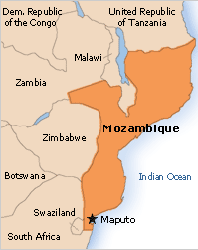When Mozambique emerged from its grueling war of liberation in 1975, it was immediately plunged into a civil war that would last until 1992.
Under such uncertain conditions, the country's leaders had little time to implement laws or ratify international conventions.
This failure was partly responsible for the emergence of human trafficking gangs, who buy, transport and sell men, women, and children against their will.
According to data released by the International Organization on Migration in 2003, the latest report on human trafficking in Mozambique, at least 1,000 Mozambican women and children are being trafficked every year.
Most of them are taken to South Africa where they are forced into prostitution or poorly paid labor.
The report also revealed that some of the women trafficked from Mozambique were sold for as little as $150 when they reached their destinations.
Implementing legislation
Mozambique has ratified international legal conventions against human trafficking.
However, until earlier this year, the country had no specific legislation under which to prosecute those suspected of involvement in the illicit trade.
As a result, offenders were, at best, charged with offences carrying lighter sentences, such as kidnapping; many had their cases thrown out of court.
As a result, the UN began working with the Mozambican government to implement legislation specifically targeting trafficking.
In April, the country's parliament worked with three UN agencies to approve three bills related to the protection of women and children.
Armando Guebuza, the country's president, signed the bills into law in June.
As well as playing a key role in persuading the government of the importance of such legislation, Unicef also worked with politicians to draft the final bills.
Ursula Pais, Unicef's children's rights specialist in Mozambique, says the government needed "one document that would specifically address the issue of human trafficking".
"We [the UN] are considered as parties to governments. Our job is to work with governments to fulfill their mandate to their people and that is how we supported the government [in setting] up its anti-trafficking laws," Pais told Al Jazeera.
She is optimistic that the new legislation will help to protect the rights of Mozambique's most vulnerable.
Cautious optimism
Victims of trafficking and their families have welcomed the legislation but are waiting to see what impact it will have.
Eusebio Mucavele, a 42-year-old father of three, says his niece was trafficked to South Africa in 2000 and rescued six months later from a Johannesburg brothel.
He is happy that the government has finally approved laws to prosecute the perpetrators but believes the credit for the "good work" must go to the UN.
"Our governments always lack the will and they prioritize other issues of their own interest.
"I applaud the UN for assisting and always pushing for the development of these laws. Many women and children will now be saved from unscrupulous traffickers," he said.
These sentiments are shared by many other Mozambicans.
Americo Ubisse, a law student in Maputo, the capital, says the UN has tried its best to fulfill its mandate but "it's difficult for the organization to attain a 100 per cent success rate when it has to deal with politicians who are not willing to ratify international conventions to protect their citizens".
Children rescued
While organizations working with those most vulnerable to traffickers say it will take time to see the full impact of the new laws, there has been an increase in the number of children rescued from traffickers since they were introduced.
According to local media reports, more than 500 children were rescued from alleged traffickers between June and November after police intercepted the vehicles they were being transported in.
Fabiao Mondlane, the editor of TribunaFax, a Maputo-based daily independent newspaper said: "Since the government approved the anti-trafficking laws, with [the] assistance of international organizations like the UN, we have seen an increase in the number of exposed cases of human trafficking.
"I think people are now willing to report cases as they know there now exists legal instruments to try perpetrators."
PHOTO CAPTION
Map of Mozambique
Source: Al-Jazeera


 Home
Home Discover Islam
Discover Islam Quran Recitations
Quran Recitations Lectures
Lectures
 Fatwa
Fatwa Articles
Articles Fiqh
Fiqh E-Books
E-Books Boys & Girls
Boys & Girls  Ramadan
Ramadan Fatwa Audios
Fatwa Audios Month of Mercy
Month of Mercy Women
Women Eed Al- Fitr
Eed Al- Fitr Food Recipes
Food Recipes Videos
Videos

 Prayer Times
Prayer Times












